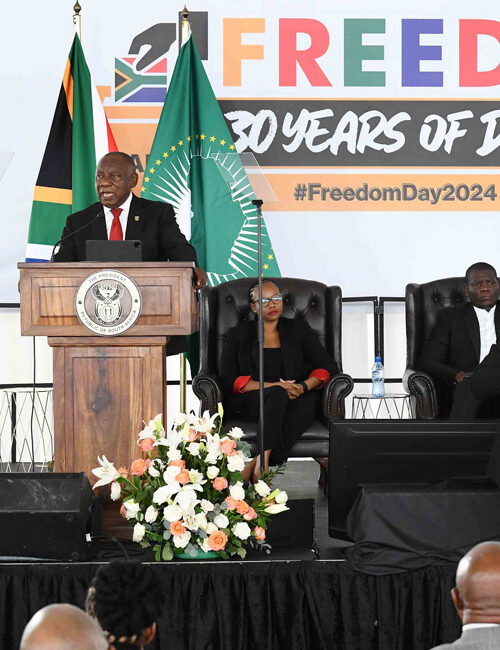Sanibonani. Molweni. Goeie môre. Dumelang. Kgotsong. Lotjhani. Ndi matsheloni. Nhlekanhi. Good morning.
This is how the President of the Republic of South Africa, Cyril Ramaphosa, greeted the crowd gathered on Saturday at the Union Buildings in Pretoria to join this year’s Freedom Day Celebrations.
As the country marked 30 years of freedom, Ramaphosa remarked that exactly thirty years ago on the 27th of April, freedom’s bell rang across our great land.
“It rang in every city, every town and every village.
“It could be heard in Musina and Thohoyandou in the furthest reaches of the north; in the vast expanses of the Kalahari, the Karoo and the Richtersveld; Komatipoort, Ermelo, Tsitsikamma, Bhisho, Mthatha, Ulundi, Durban and Manguzi on the Eastern Seaboard; in Saldanha, Cape Town and Klein See on the Western Seaboard of South Africa.
“The sound of freedom rang in Soweto, in Sharpeville, Soshanguve, Evaton, Botshabelo, Umlazi, Khayelitsha, Mitchell’s Plain and Mangaung.
“It rang in Kliptown, where the Congress of the People met in 1955 to lay out the vision for a new, free South Africa.
“It rang here at the Union Buildings, a place that had been a symbol of power and oppression for more than a hundred years,” said the country’s First Citizen.
He said as the country celebrate, all those who fought for justice, peace and freedom in our land are recalled and honoured.
“We remember the heroes and heroines whose actions made it possible for us to gather here today as a free people. On this day, we fondly remember Nelson Mandela, our first democratically elected president and the father of our democracy,” said Ramaphosa.
The President said South Africa’s democracy is young while most of the world’s most established democracies are over a hundred years old. He called on all South Africans to be proud of the The progress that has been made in a relatively short period of thirty years.
He said over the past thirty years the country sought to implement policies and programmes that advance equality and human dignity in areas like economic empowerment, education, health care, social support and the provision of basic services.
During apartheid, the policies, programmes and services of the state had a strict racial bias and hierarchy.
He said the task of the government over the last 30 years has been to bridge the huge divides of wealth and opportunity in the country – between black and white, between men and women, between urban and rural dwellers.
“We have done so not only to correct the injustices of the past, but also so that we may realise the full potential of an economy in which every person has a stake and in which every person has the opportunity to make a meaningful contribution,” added the President.

